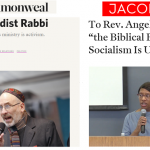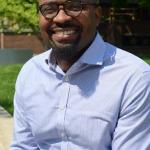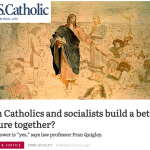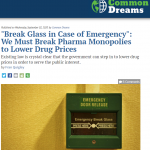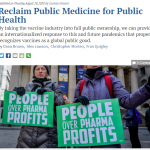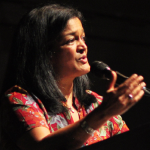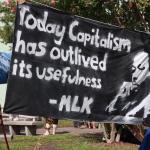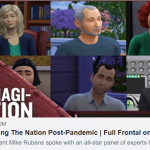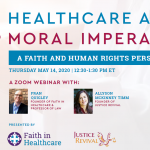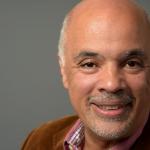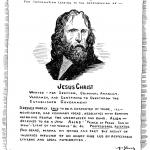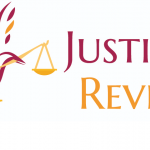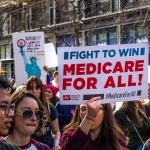Our Faith in Healthcare editor this week published articles profiling Rev. Angela Cowser, a Presbyterian minister, Louisville Seminary associate dean, and co-chair of the Institute for Christian Socialism--in Jacobin magazine-- and Rabbi Michael Feinberg, director of the Greater New York Labor-Religion Coalition, veteran of successful living wage campaigns, and an active member of the Religious Socialism Working Group of the DSA--in Commonweal magazine.
After exit polls this month showed 72% of voters wanted Medicare for All, we are excited for this November 24th Multifaith Forum on Medicare for All, including Rev. David W. Greene, Sr., Rabbi Jordana Chernow-Reader, Hebah Kassem, and Fr. Charles Allen, co-sponsored by Medicare for All Indiana and the Religious Socialism Committee of Central Indiana DSA.
“When we have a health care system that does not care for millions, when we have vacant apartments sitting above people who are sleeping in the streets, we need to move beyond just management of inequality,” says Rev. Andrew Wilkes, a Baptist minister who is active in the Religion and Socialism group of the Democratic Socialists of America. Thanks to The Bias, the magazine for the Institute for Christian Socialism, for first publishing this article by our editor.
"Roman Catholic and Christian Socialism author John Cort gave talks at Catholic parishes where he read excerpts from papal encyclicals and asked the audience to guess their author. The most common response was Karl Marx." Thank you to U.S. Catholic magazine for publishing this article by our editor.
Hebah Kassem shares how her Muslim faith propels her Medicare for All advocacy. “Respecting and pushing for human rights is just second nature to me, and I did not understand until recently how much my religion shaped that,” she says. “We were always taught at home and at Islamic school that the foundation of Islam is an obligation to ensure that everyone’s basic needs are met.”
Our editor published this article in Common Dreams, part of a series led by the Democracy Collaborative and Social Security Works on how to transform the pharmaceutical sector for the public good. All are invited to join the dozens of organizations, advocates, and scholars who signed our open letter to elected officials at publicmedicines.org
Our editor is one of four co-authors of a groundbreaking COVID-response manifesto, “Reclaim Public Medicine for Public Health,” signed by dozens of public health organizations and experts.
The COVID-19 pandemic has caused millions of Americans to lose their employer-based health insurance. Taxpayers have already paid billions of dollars for research for a vaccine, but for-profit pharma companies refuse to guarantee any vaccine will be affordable to those same taxpayers.
Could anything good possibly come of this?
Maybe.
Sharp-eyed readers of the Faith in Healthcare newsletter will have noticed that our editor, Fran Quigley, has published several recent articles on religious socialism. He has also been spending an increasing amount of his time helping edit and contribute to the blog and podcast of the Religion and Socialism Working Group of the Democratic Socialists of America (DSA). He considers himself a religious socialist, and offers seven signs that may suggest you are one, too.
A coalition of Indiana religious leaders is calling on Indiana Governor Eric J. Holcomb to respect the lives and labor of Indiana families during the ongoing COVID-19 global pandemic and to correct his leadership team’s potentially life-threatening factual misstatements of Federal and Indiana law regarding the rights of Hoosiers on the job.
Last week, Faith in Healthcare’s editor was interviewed for the show Full Frontal with Samantha Bee about the logic of nationalizing the U.S. pharmaceutical system, and participated in a webinar hosted by Justice Revival entitled “Healthcare as a Moral Imperative: A Faith and Human Rights Perspective.”
Would we already have a COVID-19 vaccine if we de-privatized our pharma system?
Probably.
This week, Governor Eric Holcomb and his senior leadership team warned unemployed Hoosiers that they must return to their jobs or risk losing access to unemployment benefits, even if they feel that going back to their workplace is unsafe. Those warnings misstate Indiana and federal law and could put thousands of Hoosiers at risk of sickness and even death.
Samuel Cruz thought he had to choose between his faith and his politics.
Cruz’s family and their fellow Pentecostals, although deeply compassionate and devoted to caring for others, rejected political engagement. Cruz’s friends faced similar conflicts. “As they became more political, many people my age were becoming atheists or, at a minimum, non-church goers,” he recalled. “But I didn’t want to give up on the church and religion.”
Then Cruz found liberation theology.
Socialism is more popular in the U.S. now than at any time since the early 20th century, and religion played a big part in both eras. Just like socialists today rally around Bernie Sanders, who credits his Jewish heritage for shaping his beliefs, the 1900's movement was led by Eugene Debs, who was deeply influenced by Christian socialists of the time.
Faith in Healthcare’s editor, Fran Quigley, was interviewed last week by Justice Revival founder and director Allyson McKinney Timm, a theologically trained human rights lawyer. Justice Revival is a dynamic new organization dedicated to serving as a Christian voice for human rights in the U.S. The video interview covers the universal faith commitment to healthcare for all, how the lack of COVID-19 preparation and poor response reveals the core for-profit dysfunction of the U.S. healthcare system, and how people of faith can speak up for a better future.
Other states’ governors are rising to the challenge of the COVID-19 jobless crisis by providing fast, accurate information and expanding access for unemployment benefits. But hundreds of thousands of Hoosiers are deeply worried and risking their health in dangerous work settings because they don’t know about the new federal law that will allow them to qualify for benefits. Indiana’s Department of Workforce Development phone lines are down, its online application process is complicated and confusing, and its website includes both errors and a don’t-call-us shrug of the shoulders in response to questions about how the federal legislation will impact Hoosiers.
“Every single person in the healthcare system is at risk, including our environmental services colleagues and the workers at the front desk,” says Amy Hale, MD, who is treating patients in Columbus, Indiana. Dr. Hale speaks out to protest the shameful lack of personal protective equipment for our sisters and brothers providing care in the midst of the COVID-19 pandemic. “You would be hard-pressed to find a healthcare worker who does not have some fear right now.”
Jairav Desai describes the Buddhist notion of interdependence, which stands in opposition to the capitalist idea of a self that can prosper through competition, individual wealth, and recognition. To Buddhists, that obsession with personal gain is not just immoral. It is based on a fallacy—an illusion of separateness. "I’m now at a place where my Buddhist spirituality and my socialist political views are in harmony,” he says.
The breathtaking level of U.S. unpreparedness for this crisis may seem remarkable, given that we in the U.S. spend far more per capita on healthcare than any other nation in history.
The problem is clear. We have allowed the profit motive to drive our U.S. healthcare system, and it has driven us straight into a ditch.
This article by our editor is being co-published in Sojourners and Democratic Left.

